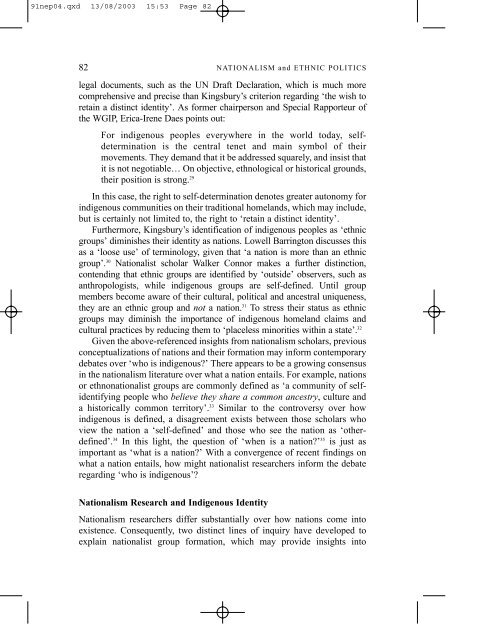Who is Indigenous? 'Peoplehood' and Ethnonationalist Approaches to Rearticulating Indigenous Identity
by Jeff J. Corntassel
by Jeff J. Corntassel
You also want an ePaper? Increase the reach of your titles
YUMPU automatically turns print PDFs into web optimized ePapers that Google loves.
91nep04.qxd 13/08/2003 15:53 Page 82<br />
82 NATIONALISM <strong>and</strong> ETHNIC POLITICS<br />
legal documents, such as the UN Draft Declaration, which <strong>is</strong> much more<br />
comprehensive <strong>and</strong> prec<strong>is</strong>e than Kingsbury’s criterion regarding ‘the w<strong>is</strong>h <strong>to</strong><br />
retain a d<strong>is</strong>tinct identity’. As former chairperson <strong>and</strong> Special Rapporteur of<br />
the WGIP, Erica-Irene Daes points out:<br />
or indigenous peoples everywhere in the world <strong>to</strong>day, selfdetermination<br />
<strong>is</strong> the central tenet <strong>and</strong> main symbol of their<br />
movements. They dem<strong>and</strong> that it be addressed squarely, <strong>and</strong> ins<strong>is</strong>t that<br />
it <strong>is</strong> not negotiable… On objective, ethnological or h<strong>is</strong><strong>to</strong>rical grounds,<br />
their position <strong>is</strong> strong. 29<br />
In th<strong>is</strong> case, the right <strong>to</strong> self-determination denotes greater au<strong>to</strong>nomy for<br />
indigenous communities on their traditional homel<strong>and</strong>s, which may include,<br />
but <strong>is</strong> certainly not limited <strong>to</strong>, the right <strong>to</strong> ‘retain a d<strong>is</strong>tinct identity’.<br />
urthermore, Kingsbury’s identification of indigenous peoples as ‘ethnic<br />
groups’ dimin<strong>is</strong>hes their identity as nations. Lowell Barring<strong>to</strong>n d<strong>is</strong>cusses th<strong>is</strong><br />
as a ‘loose use’ of terminology, given that ‘a nation <strong>is</strong> more than an ethnic<br />
group’. 30 National<strong>is</strong>t scholar Walker Connor makes a further d<strong>is</strong>tinction,<br />
contending that ethnic groups are identified by ‘outside’ observers, such as<br />
anthropolog<strong>is</strong>ts, while indigenous groups are self-defined. Until group<br />
members become aware of their cultural, political <strong>and</strong> ancestral uniqueness,<br />
they are an ethnic group <strong>and</strong> not a nation. 31 To stress their status as ethnic<br />
groups may dimin<strong>is</strong>h the importance of indigenous homel<strong>and</strong> claims <strong>and</strong><br />
cultural practices by reducing them <strong>to</strong> ‘placeless minorities within a state’. 32<br />
Given the above-referenced insights from national<strong>is</strong>m scholars, previous<br />
conceptualizations of nations <strong>and</strong> their formation may inform contemporary<br />
debates over ‘who <strong>is</strong> indigenous?’ There appears <strong>to</strong> be a growing consensus<br />
in the national<strong>is</strong>m literature over what a nation entails. or example, nations<br />
or ethnonational<strong>is</strong>t groups are commonly defined as ‘a community of selfidentifying<br />
people who believe they share a common ancestry, culture <strong>and</strong><br />
a h<strong>is</strong><strong>to</strong>rically common terri<strong>to</strong>ry’. 33 Similar <strong>to</strong> the controversy over how<br />
indigenous <strong>is</strong> defined, a d<strong>is</strong>agreement ex<strong>is</strong>ts between those scholars who<br />
view the nation a ‘self-defined’ <strong>and</strong> those who see the nation as ‘otherdefined’.<br />
34 In th<strong>is</strong> light, the question of ‘when <strong>is</strong> a nation?’ 35 <strong>is</strong> just as<br />
important as ‘what <strong>is</strong> a nation?’ With a convergence of recent findings on<br />
what a nation entails, how might national<strong>is</strong>t researchers inform the debate<br />
regarding ‘who <strong>is</strong> indigenous’?<br />
National<strong>is</strong>m Research <strong>and</strong> <strong>Indigenous</strong> <strong>Identity</strong><br />
National<strong>is</strong>m researchers differ substantially over how nations come in<strong>to</strong><br />
ex<strong>is</strong>tence. Consequently, two d<strong>is</strong>tinct lines of inquiry have developed <strong>to</strong><br />
explain national<strong>is</strong>t group formation, which may provide insights in<strong>to</strong>


















